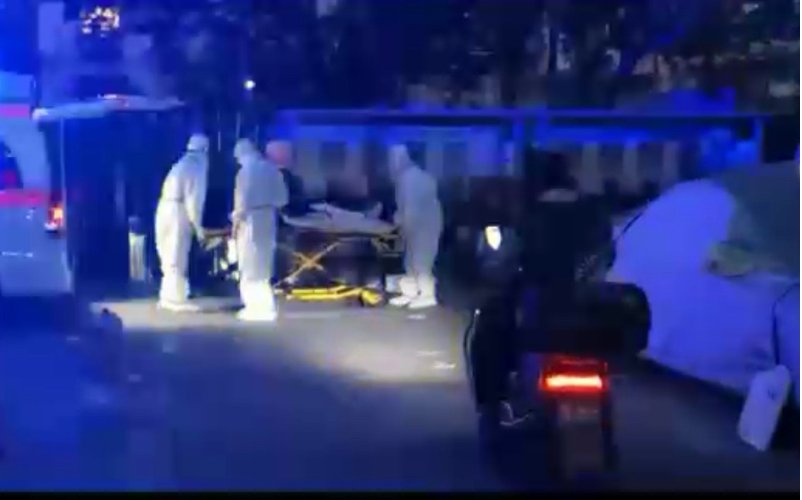
▲Through the “closed loop direct delivery” scheme, in the closed building Leukemia patientswere promptly sent to the hospital for treatment. Photo courtesy/Chaoyang Police
The residents were in the closed area and suddenly Emergency, how to seek medical treatment?
In the evening of April 26, the police of Panjiayuan Police Station in Chaoyang District, Beijing dispatched 120 ambulances to the scene quickly, and coordinated multiple departments through the “closed-loop direct delivery” plan. The leukemia patients in the closed building were sent to the specialized hospital for treatment in time.
According to the current Beijing anti-epidemic policy, the lockdown area implements “area closure, stay-at-home, door-to-door service”, and residents strictly implement home isolation measures. This is also an effective means to implement precise prevention and control and effectively curb the spread and spread of the epidemic in the community. In fact, in the three years since the outbreak of the epidemic, Beijing has formed a fairly mature solution to the medical needs of special groups in special areas in special times.
Yang Beibei, deputy head of Chaoyang District, Beijing, introduced at the press conference on epidemic prevention and control held in Beijing on the 27th that after the delineation of the closed area, the first In time, a medical service team will be set up to provide services for residents’ special needs such as medical treatment, drug purchase, maternity inspection, dialysis, etc., open up green channels for medical treatment, and provide 24-hour guarantee for residents’ medical needs.
In March this year, Shuangyushuxili in Haidian District was designated as a closed area, and the green channel was used many times to achieve closed-loop medical treatment. The whole process forms an efficient closed loop, from residents’ initiation of medical needs, to social workers escorting them to the doctor, and then to the hospital sending the patients back. For acutely ill patients, the community directly contacts the doctor of the corresponding hospital for quick delivery; for patients with chronic diseases, the community registers the medical treatment information in a timely manner and shares it in the medical security group, and sends it to the doctor after confirmation by the doctor.
Looking at the whole process, the closed loop isolates the risk of transmission, the green channel ensures the smooth flow of medical treatment channels, and finally patients receive timely treatment. Behind the “closed-loop direct delivery” is the formation of a closed loop of social governance in which policy design echoes the grassroots, reflecting the significant value of Beijing’s refined governance in a special period.
The residents of the closed area live as usual, and they are deeply dependent on efficient and refined “closed-loop governance”. This not only requires the streets and communities to fully grasp the special needs of residents in the first time, but also requires the close cooperation of volunteers, medical units, police and other parties. It also depends on the efficient coordination and guarantee mechanism formed by the grassroots and functional departments. Only in critical moments can the “troublesome things” encountered by residents be solved in a refined manner.
This is not something that can be done overnight. In recent years, Beijing has adopted a series of reform measures to continuously promote the development of the grass-roots governance system. From “whistle blowing in towns and villages and reporting to the department” to “action upon receipt of a complaint” and “action without complaint”, the progressive urban governance model has realized that residents “get what they ask for, and what they give is what they need”. effective way.
The prevention and control of the epidemic is the most direct test of the refined governance at the grassroots level: on the one hand, it is necessary to do a good job of regional nucleic acid Screening, controlling risks as quickly as possible, and curbing the spread of the epidemic; on the other hand, it is also necessary to ensure the normal living needs of residents – opening up the “last 100 meters” of material supply to help special groups solve practical difficulties. These are the proper meanings of urban refined governance.
Of course, the fine-grained governance at the grassroots level during the epidemic also requires functional departments and community cadres to “sink and stand up”, and quickly Gather strength to solve the pain points and difficulties of people’s livelihood.
In the afternoon of April 25th, due to the discovery of multiple confirmed cases in Huguosi Snacks (Guangmingqiao Branch), Chaoyang District needs to conduct temporary inspections on relevant risk points. Control. At the critical moment, through the emergency deployment of forces, 600 government officials were sent to support, and the officials of government agencies, enterprises and institutions in the region were turned into volunteers on the spot, which quickly enriched the prevention and control service force. The grassroots governance forces for epidemic prevention and control can quickly gather, so as to gain time and opportunity to block the risk of transmission as soon as possible.
During the epidemic and in critical moments, whether the control area can unblock logistics channels and ensure the supply of citizens’ “vegetable baskets”; whether it can promote data to empower grassroots governance and improve its efficiency. The level of refined management; whether it can meet the needs of special populations and open up a green channel for efficient operation… all directly related to whether it can quickly respond to the “urgent and anxious things” of residents. The refined urban governance is not only related to the efficiency of grassroots governance, but also can make epidemic prevention and control more warm and ensure the implementation of the concept of “people first, life first”.
Writing/Xin Ran (media person)
Editor/Liu Yunyun
Proofreading/Li Lijun< /div>